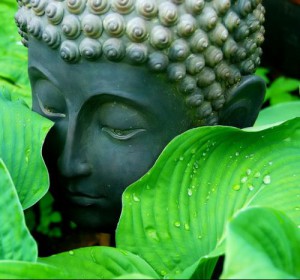Monday
Community ArticlesIt’s Not Easy Being Blue
By Elaine Logan
Depression doesn’t have to rule my life—but I don’t have to pretend it isn’t there, either.
Eeyore doesn’t mess about.
You know Eeyore, he’s the donkey in the Winnie the Pooh stories. When there’s a birthday party, Eeyore is sure it won’t be for him. When someone moves his house of sticks, he understands it was foolish of him to think he could have a house in the first place.
Eeyore has a frankness about his mental affliction. He’s depressed and he lets you know it.
For many people who struggle with depression and other mental afflictions, it’s not that easy; it’s hard to reach out to others. You white-knuckle it. Everyone else seems to be doing okay and you want to say, “I’m doing okay too. It’s not so bad.” You want to be a good sport, because superficial contact leaves your pride intact.
But you know it’s not okay. You deal with it every day and on a bad day, you’re not dealing with it at all.
Inertia
Chinese medicine believes depression is when the chi is stagnant. Nothing moves. In my case laundry doesn’t move and dirty dishes don’t move—not even that short distance to the washer and the dishwasher. Here’s how it goes: I look at the dirty dishes. I look at the full dishwasher that needs emptied. I shrug and prepare a slice of toast.
It begins with analysis paralysis and ends with total collapse of motivation. You just ignore things, which gets easier with practice. A whole weekend can slip by with only two John Grisham novels and five episodes of Law and Order to show for it. What a waste. We all participate in the human condition and when one person opts out of life, it dims the brightness for the whole lot of us—us humans, us mugs.
Resilience
Resilience is key. Resilience is when I clean the bathroom and it’s no big deal. Resilience is when I go to social events where I see friends and acquaintances. I don’t even think about it, I just do it. When resilience isn’t there, I don’t even try to decide what to do. I just curl up on the couch with a book, and if I don’t have a good book, I go to bed.
Medication
Medication can and does help. Medication can increase resilience. Buddhist meditation master, Thrangu Rinpoche, said about taking antidepressants, “Yes. They should take it if it helps. They have suffered enough.”
And yet, medication is no magic bullet. Family members of depressed people only see certain medications improve their loved one’s mood. It takes respect to understand the challenge. It’s hard to find medication that won’t create a side effect worse than the original condition. My friend’s father notices she is happier on her new meds. He doesn’t realize she hasn’t slept for three days or perhaps she is sleeping all day.
For some people, life is a constant search for a better medication, because medications that once worked no longer do. For others, their body chemistry won’t tolerate the side effects of medication and they need to work hard at a personal program of self care.
Isolation and Fantasy
It’s easy to feel all or nothing about friends. When you have friends who are disapproving or judgmental, it’s easy to think, “Well we don’t have a great time together, it’s true. But hey, it’s better than no friends, right? And, after all, who else will spend time with me?” That’s the depression talking, and it’s all part of the downward spiral.
Like Eeyore, depressed people can find it hard to roll with ups and downs and difficult-to-maintain healthy boundaries with others. In work, friendship or even at the grocery store checkout, it becomes an easy option to push people away. When there is only frustration and no resilience, everything becomes fuel for beating ourselves up.
Another easy option can be to look for a fantasy solution: taking your romantic crushes too seriously, dreaming about winning the lottery or that fortune cookie favorite—You will inherit a small plot of land. Of course there’s always that great book you will write or, as Bob Dylan put it, when you paint your masterpiece.
A depressed person can miss the point of the simplest human interaction. They can miss the opportunity to smile and say hello.
I’ve been there and missed that moment many times.
Meditation
A discipline of meditation and yoga can make a huge difference. At the same time, you need a certain level of resilience to keep that discipline. In cases of extreme depression, meditation and yoga can become sticks to beat yourself up with, another thing you need to make yourself do.
I meditated for 30 years and I hoped meditation was enough. It was wonderful, but it wasn’t enough to cure depression by itself.
Struggle and Resistance
I struggled with depression for most of my life. I remember how I sat on the stairs at parties and cried when I was sixteen. I drank cans of Carlsberg and listened to well-intentioned friends tell me I just needed a good kick in the pants.
For many years I struggled with the decision to medicate or not medicate. I felt I should be able to do better. I felt it was my fault I have these difficulties. I wanted to beat it myself. An alcoholic will say, “I wish I could drink like other people. I wish I could have a normal relationship with alcohol.” I wish I could live without medication, like other people. My history proves I don’t do well without medication.
When I take a medication that works, I feel more like myself. It’s like going to the optometrist and getting glasses. Oh yes, now I can see things.
In a recent conversation, my doctor confirmed I had symptoms of chronic depression for 20 years and tried various medications for about 15 years. She compared it to a patient with heart disease. “It’s not your fault,” she said, bringing tears to my eyes. “It runs in families. Looking at your family history, your father was an alcoholic. Likely he was self-treating himself for depression. Fifty, sixty years ago they had different names for it: high-strung, bad tempered, lazy. It’s all the same illness. It’s all depression.”
So, I take the medication. I want to act well and leave a good footprint in the world. Another of my doctors told me my current medication can shorten my life. I recently attended a Tibetan Buddhist long life empowerment ceremony presented by Yangsi Rinpoche. Rinpoche put my feelings into words when he said, “Oh, by the way, no point living an extra two to three hundred years feeling angry and resentful, right?”
Suicidal Thinking
It breaks my heart when I hear that dear friends have taken their lives. I’ve heard it many times now. It helps me to believe they did their best to cope with a tragic affliction and I’m glad that they prevailed as long as they did. One friend told me, “When I feel suicidal, there is nothing I or anybody can do except not kill myself in that moment and the next. Sometimes if I can just get through the minute, hour or day, things can shift.”
I tried to take my own life at age 19. I took a bus to a cliff outside Aberdeen, Scotland. I cut the veins on my wrists and not the arteries. This gave me a second chance. When I walked back from that stormy cliff, I got help from a local farming family. The distress on their faces told me how my life can affect others, and I never forgot that.
So when the depression talks to me about my worthlessness and what’s the point of me, anyhow, I pick up the phone. One time, when a wrong medication took me to the dark side, I called my doctor. She sent two policemen out to my house.
Meanwhile I found a Steve Martin/Queen Latifah movie on TV. Laughter brought me out of it enough to tell the cops I knew I was okay.
What Works
There are no guarantees. I paint a dark picture here. I don’t want to pull my punches, because it’s tough. I believe it’s important to understand when a good person fails to prevail in the face of depressions and other mental afflictions, they gave it all they had to give.
At the same time, things can work. This isn’t a Cosmopolitan article where I give you “10 Ways to Improve your Love Life”. But sometimes, for some people, some things can and do help.
Here’s what works for me:
Recognize the Voice of Depression
When my doctor says, “That’s the depression talking. That’s your illness,” it helps me remember the depression is not who I am. I love to hear that clarity.
I am not my illness, I am not the depression. It helps me recognize the voice of depression and realize I can’t control it. It doesn’t have to rule my life, but I don’t have to pretend it isn’t there either. What I can do is make a concerted effort to override it, which is hard to do on your own. It helps me to reach out to others. If I’m stuck inside my house and inside my head with only that voice, only those demons, I’m in trouble.
That’s when I need to make a call. That’s when I need to remember who I really am.
Reach Out
It’s hard for depressed people to reach out. I’ve realized, however, that it’s part of my responsibility to make this effort and to take care of myself in this way. So, I have help and I get help with this. I talk to my doctor, friends, my daughter, my mother, an old meditation teacher, people in my Buddhist community. When finances and health insurance permit, I see a counselor.
Walk the Walk
None of the tools work for me by themselves, but I use everything I can get. I take the highest level of medication that my body can tolerate. I have a program of meditation and yoga and go to the gym. I reach out to friends—not the critics, but the people I have a really great time with. I walk Tillie, my wonderful dog who loves and puts up with me. I find ways to put up with this life. I try to remember life can be fun and that people like me.
When I know a social event is coming up, I schedule it and plan ahead that I will attend. I find it helps to talk to a friend on the phone and make a commitment to do tasks of self care: “This week I will walk Tilly three times.” “I will go to the next Saturday morning yoga class.” “I will call three people I like and suggest coffee.”
Keep a Routine
Keeping a routine makes a huge difference. I schedule dog walks, social events, trips to the gym and days at my co-working space. It’s all part of fighting back and fighting for my life instead of letting it slip through my fingers. It’s a discipline, because if I let the structure slide my life will start to slip though my fingers again. When that happens, all I can do is pray and try to get back on track.
Pray
Never underestimate the power of prayer. In my darkest moments, it helps me to pray. “Please help me through this. Please help.”
Get Busy Living
Maybe it seems like these are a lot of solutions and a lot of hard work, but it’s taken me years to realize the value in them and I know I need to work the solutions. I do it for myself, my family, my friends, my wonder dog and even the lady at the grocery checkout. I need to “Get busy living or get busy dying,” as Morgan Freeman’s character, Red, says in the movie, The Shawshank Redemption.
I’m at a turning point in my life now. I’m learning to accept myself and my struggles. I’m willing to allow the space to let life come to me without flinching. A day when I can do one thing that makes me happy is a good day; I know I can do it. I can’t help having a broken heart, but I can have an open heart.
I reach out not for a winning lottery number or a happy ending. I just reach out for another great day of being alive.
Buddha bless us all!










Jan 17, 2011
Reply
Your article reminds me of the times I used to sit in the kitchen for three days, just staring at the walls. Finally, I would realize that I was sitting there staring at the walls, and say to myself, “Oh, I must be in a deep depression.” I find it ironic that, while we can talk about having cancer and not fear rejection, there’s still a stigma towards openly discussing mental health issues! Fortunately, this is beginning to change because of courageous people like you. The thing I myself found most helpful is, as you say, to remind myself that I am not my depression, or anxiety, or fear, or whatever. Our primordial nature remains untouched.
Jan 17, 2011
Reply
Dear Elaine,
Words cannot express how wonderful it was to run across your article! I probably would not have found it if I hadn’t made Shambhala Times my home page.
I have struggled with depression most of my life (I am now 43) and was put on medication about 16 years ago.
I just recently had my medication adjusted and added one due to an onset of severe depression the past four months. Funny, I just finished a dathun in August at SMC and thought I was done with my anxiety. Plus, since I started meditating about 6 years ago, I thought meditation would cure me and I could get off medication. I stopped medication for about 7 months and almost had to call 911, but was able to call my therapist and calm down. I went back on the meds. I decided then that I should stay on the medication. However, I think is slowly was not working for me and I did not see a psychiatrist for about two years, getting my medication from my primary doctor. So, here I am and we will see how this medication works for me.
Your article was like a mirror for me: I related and saw much of myself in your story. It is a comfort for me to know that I am not alone as someone with depression who is also a Buddhist. Thank you so much.
Yours in the sangha,
Robert
Jan 6, 2011
Reply
Thank you, Christine, I’m glad it meant something to you.Thank you, Pat, Norm and Alice, I appreciate your comments and I appreciated the Susan Moon article. Life is poignant, and precious. Sometimes depression drives that home.
Thank you, Gabe, I remember you well.
Thank you, Lisa for your warm comments
Jan 4, 2011
Reply
Hi Elaine,
I wanted to thank you for your heart-felt article about your personal experience with depression. Your openness and generosity in sharing this will help so many people. I really appreciate all that you have to share. As someone who has family members who really struggle with depression your insights are very wise. I wish you the very best on your personal journey and hope to see you around soon.
Warmly, Lisa
Jan 4, 2011
Reply
Just today I had the company you write about… I had two insights. One – when I recognized its voice, I also knew that its grip can lead me into complete inertia and spending time frozen on sofa – or – I can very very gently try to do anything else, anything small that would bring more “wind”, more fresh air, stop the downward spiral. Not a big project, anything that was right there – in my case it was the bathroom sink. And then one more little thing and so on. The key was to be ever so gentle when I heard its voice, have no expectations, “keep dialogue” with outer phenomena. The line I walked was thin and I was able to do it only because of past practice. In the past I would not be able to and I know I may not be able to do it every time.
Also later in the day I had a talk with my MI, describing my various inabilities (with my practice and responsibilities in the Center) and thanks to her I more fully recognized how much of my mental state is actually result of habitual (for generations) poverty mentality. Again – in the past it would be a weapon I would use against myself, today I am curious and want to explore that area and try and learn more about the unique practices that the Shambhala teachings offer to work with this hollow state.
And now – your article! Its kind voice helped me to recognize what I deal with and that I am not alone there. It will be reminder also in the future. I think of you wishing you all the best.
Jan 4, 2011
Reply
Feeling less isolated, more connected, less self centered, and with notably less suffering, reading this personal account of depression. Rays of light, streaming out, streaming in, reaching and longing for liberation are not always easy to find at times. Here is another kind account for anyone interested:
I Want To Tell You About Coming Apart
http://is.gd/k42KS
by Susan Moon
Jan 3, 2011
Reply
Elaine,
Thank you for your generous, tender warriorship.
In the vision of the Great Eastern Sun,
Gabriel (AKA the Halloween Physical Ashe)
Jan 3, 2011
Reply
You serve us all well with your courage to write about daily life with depression. Bravo! Reaching out is so important but sometimes when you’ve let it get out of hand, the reaching out is too hard and you don’t know what to ask for. And people don’t know what you need.
What I have found helpful is to explain to a few close friends and family members that occasionally (not often) I may need to have decisions made for me…like someone to come over right away, someone to make that call to the doctor, someone to get groceries, etc.
Jan 3, 2011
Reply
Thank you for this extremely warm and real article.
It truly touched me.
With love,
Christine